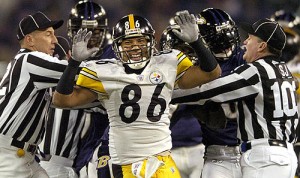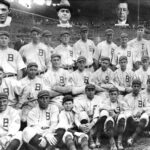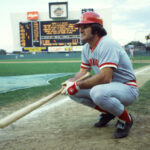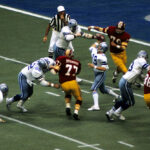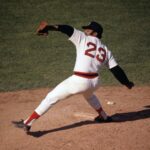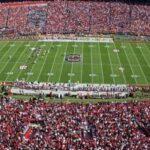Pittsburgh Steelers Miss the Point in Battle With Roger Goodell
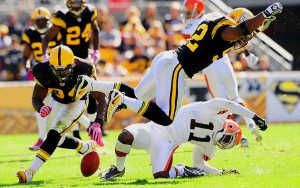
James Harrison and the Pittsburgh Steelers aren't happy with the NFL's policy for fines on illegal hits.
For decades, the Pittsburgh Steelers have used the squeaky image of the Rooney family to portray itself as the blue-collar franchise of the NFL and a team filled with hard-working every-day players. Based on their recent vote on the collective bargaining agreement, it could be argued that the Pittsburgh players are instead actually a bunch of self-absorbed thugs.
Unlike the other 31 teams, the Steelers decided that they would vote as a team against the agreement because they didn’t like that it wouldn’t significantly alter the way in which fines and punishments are administered across the NFL for illegal hits or for violations of the personal conduct policy.
The primary reason for their displeasure is that Commissioner Roger Goodell has been very stern in recent years and doesn’t play favorites.
In recent years, Pittsburgh players have been among the most fined in the NFL for hits deemed to be dangerous and beyond normal levels of physicality. Most notably, linebacker James Harrison was fined four times for $100,000 in 2010 for illegal hits.
Granted that football is generally a violent game, but there are some hits that are without question made not to tackle an opposing player, but instead to try as much as possible to inflict bodily harm on them.
The NFL has been trying in recent years to reduce those kinds of hits and make the game safer. Some of their new rules, especially those related to a quarterback, may go a bit too far, but those designed to stop helmet-to-helmet hits and to protect a defenseless player have been a positive step.
In the recent labor agreement, a big issue for the players was health and safety. They bargained for a reduction in off-season, pre-season and in-season practices under the guise that fewer practices where the players are in pads and hitting each other will help prolong careers.
Having a strong policy against illegal hits would seem to be another valuable tool in trying to make the game safer. However, for players like Harrison, who play at a reckless level, the fines and punishment is seen as a hindrance to their ability to be successful.
Were the Pittsburgh Steelers Right to Vote Against the CBA In Protest of Roger Goodell's Power?
- No (83%, 10 Votes)
- Yes (17%, 2 Votes)
Total Voters: 12
I would argue against that, as other players throughout history have been able to harness their intensity without taking it beyond safe levels.
Based on their vote against the labor agreement, it would appear that the Steelers are saying that personal safety isn’t really as important to them as it is to others.
They don’t like that players like Harrison receive increased penalties for multiple offenses even if the third hit wasn’t necessarily as brutal as the first or second. Evidently, they miss the point that the fines are designed to be a deterrent to such actions and an incentive for players to change their ways and adhere to the rules.
In addition to fines based on illegal hits, since 2007 the NFL has instituted an aggressive personal conduct policy designed to deter players from repeatedly taking part in actions that result in criminal prosecution and embarrass the player and the league.
A number of players have argued that players should not be punished for actions that occurred during the recent labor dispute. For Pittsburgh, that argument is especially important because one of their own veterans, wide receiver Hines Ward, faces punishment after a recent DUI arrest.
That argument seems to forget that the conduct policy itself was called for by the players to help clean up the image of a league where it seemed more players were getting police records off the field than were setting performance records on it.
Much of the frustration of Harrison and the other Steelers regarding the entire fine structure is that Commissioner Goodell has levied the fines himself without consulting others and rarely changes or reduces penalties (though last year Harrison had one fine reduced from $75,000 to $50,000 and quarterback Ben Roethlisberger had a six-game conduct policy violation reduced to four games).
Harrison expressed his dislike for Goodell during a recent interview with Men’s Journal with some very inappropriate and uncalled for remarks where he called Goodell a “crook” and the “devil.” He also expressed that if Goodell was burning he would not use his own urine to put out the fire.
There is certainly room for an argument that there should be more than one person deciding appropriate punishments for illegal hits and conduct policy violations, but there is also an argument for having one person responsible for these decisions.
I think that when Harrison and other players complain about the severity of fines, they are missing the primary point. The penalties are levied to illustrate the importance of the issue within the league and to encourage the player to act differently in the future (whether on the field or in their personal lives).
In a world where many players make more money in a single year than most people will earn in a lifetime, giving a $5,000 fine for a DUI, domestic violence offense or late-hit that ended an opponent’s season or career would do nothing to deter the player from doing that action in the future.
However, if the player faces possible suspension (and thus loss of game checks) as well as a hefty fine, then maybe they will think twice before they get behind the wheel after having 12 beers or will pull up when a receiver is airborne in the middle of the field stretched out to try and catch a pass.
Even though the Pittsburgh Steelers voted as a team against the collective bargaining agreement in their own version of a temper tantrum (or perhaps as a statement of protest for those who are on the side of the team), they will be taking the field in 2011.
Hopefully Harrison and the other players will follow the rules and not be the recipients of any fines this season. However, should that not happen, I hope Goodell doesn’t try to appease the Steelers by reducing their punishment if the situation warrants.
If safety and personal conduct are really as important to the players as they claim them to be when it is in their best interest to say they are, then they need to support stringent penalties that over time will hopefully lead to a reduction in the number of times that Goodell has to invoke his power.
After all, eliminating the need for Goodell to invoke his power would really put him in his place and show him who’s boss, right?
